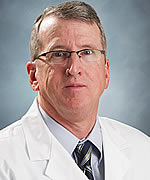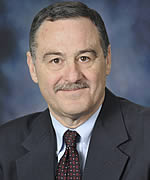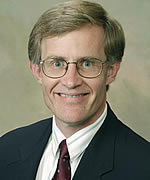ECU to extend diabetes care to rural areas via video conferencing
GREENVILLE, N.C. (Aug. 27, 2013) — At a small medical practice in the Duplin County town of Wallace, one diagnosis tends to stand out.
“Diabetes is rampant in eastern North Carolina,” said Dr. Mott Blair of Vidant Family Practice-Wallace. “Sometimes it seems like every patient you see has diabetes.”
Soon, Blair’s patients, and others like them around eastern North Carolina, will get some help managing their disease and preventing costly and tragic complications.

Dr. Mott Blair
That’s thanks to a pair of grants totaling more than $1 million that will allow researchers at East Carolina University to develop a program that will support collaborative diabetes care in rural areas via telemedicine.
The Office of Rural Health Policy at the federal Health Resources and Services Administration has awarded ECU’s TeleTEAM project a three-year, $750,000 grant to implement the program at rural primary care practices in eastern North Carolina. The project is also funded by a recent two-year, $325,478 grant from the Kate B. Reynolds Charitable Trust.
Dr. Doyle Cummings, a pharmacist and professor of family medicine and public health at the Brody School of Medicine at ECU, and Dr. Dennis Russo, a psychologist and clinical professor of family medicine at ECU, are leading the project.
Cummings said when patients with diabetes are seen at the ECU Family Medicine Center, they have access to counseling from psychologists, pharmacists and dietitians to help them manage their diabetes and avoid costly hospitalizations.
“These two pieces of funding give us the opportunity to try and provide the same thing for these outlying practices,” Cummings said.
In the project, secure two-way audio and video links will connect experts at ECU to seven rural primary care sites: Vidant Health practices in Aurora, Pinetops, Tarboro, Wallace and Windsor and Goshen Medical Center sites in Wallace and Faison.
Cummings will use the funds to acquire equipment, hire and train staff and test the system this fall. The grants will also fund hiring a health psychologist, nutritionist and pharmacist, either full or part time. He hopes to begin patient care in January.
In eastern North Carolina, approximately 10 percent of the population has type 2 diabetes, compared to 8.7 percent in the rest of the state, according to the ECU Center for Health Systems Research and Development. It’s also the fifth-leading cause of death in the region.
“Diabetes is a big enough problem, there’s lots and lots of unmet need out there,” Cummings said.
Blair, a 1987 graduate of ECU’s medical school, said the project will provide expertise to his patients they might not otherwise receive.
“The biggest hurdle for rural care is access,” said Blair, a second-generation physician whose father opened a practice in Wallace in 1949. “You simply don’t have the access to all the services you have in a city.”
Being able to talk with a pharmacist, a psychologist and a dietitian will help his patients take an active role in improving their health and avoiding costly and tragic complications such as renal failure, blindness and vascular disease, he said. It will also help build a team-based approach to care that’s vital to chronic disease management.
“The biggest hurdle with diabetes is patient engagement,” he said. “They have to be involved with their care. You cannot do all this and do it successfully in a 10-minute doctor visit. You have to have a team approach.
“We’re pretty excited about the possibility,” he said.
Also contributing to the grant proposal were Paula Munos of the ECU Department of Family Medicine; Dr. Lauren Whetstone, a former family medicine faculty member at ECU; and Debra Thompson and Paul Bray of Vidant Medical Center.

Dr. Dennis Russo

Dr. Doyle Cummings